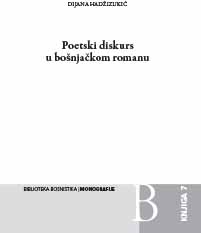Poetski diskurs u bošnjačkom romanu
Poetic discourse in Bosniak novel
Author(s): Dijana Hadžizukić
Subject(s): Bosnian Literature, Theory of Literature
Published by: Slavistički komitet BiH
Keywords: Bosniak literature; Hamza Humo; Ćamil Sijarić; Meša Selimović; Nedžad Ibrišimović; Jasmina Musabegović; Bisera Alikadić; Skender Kulenović; Tvrtko Kulenović; Irfan Horozović;
Summary/Abstract: It has been noted, in the critical literature of the Bosniac novel, that with all the common traits that it shares with the novel of European and South Slavic region, its poetics has some specific characteristics of its own, which are of differential value and are an unavoidable poetic fact Upon recognizing the accentuated poetisation in certain number of novels, the need forits further highlighting and detailed analyses has imposed itself—the analyses which would point to the features of the structure of the Bosniac novel that make it different and that affect its poetisation, producing one of the aspects of its interior history The study analytically encompasses the following novels: Grozdana’s Giggle by Hamza Humo; Konak and the Czar’s Army by Ćamil Sijarić; Dervish and the Death and The Fortress by Meša Selimović; Ugursuz and Karabeg by Nedžad Ibrišimović, The Bridge by Jasmina Musabegović, Larva by Bisera Alikadić, Groundwater by Skender Kulenović; Man’s Family by Tvrtko Kulenović; and The Imotski Kadija by Irfan Horozović Furthermore, the poetisation of the narrative discourse has been found on different structural levels of the texts, each novel having different level of poetisation, in terms of quantity and quality Observed in the broader context, poetisation is achieved through the connection of figurative with cognitive and emotional tendencies, defamiliarized chronotope,process of characterization of characters, and interior monologueas one of the key forms of narration, as well as through the emphasized rhytmisation of the prose discourse, which was all enabled with the emergence of the modern novel The novel Grozdana’s Giggle by Hamza Humois the first modern Bosniac novel, and the first one to be written in the poetized form in our literature It appeared in 1927, during the period of European avangard and lyricism revolution; so, the influence of the modern techniques of novel writing as well as of the prevailing lyricism in the literary trends of the period in question, greatly affected its structure On the other hand, Humo’s background which was one of extremely rich mixture of cultural and civilizational heritage that he assimilated and creatively upgraded,would, even after the retreat of the avangard poetics from the literary scene, continue to affect our novels, written in the second half of the twentieth century.
- Print-ISBN-13: 978-9958-648-05-2
- Page Count: 278
- Publication Year: 2011
- Language: Bosnian
- eBook-PDF
- Table of Content
- Introduction

